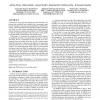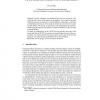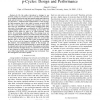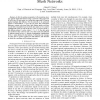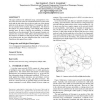103
Voted
BROADNETS
2004
IEEE
15 years 6 months ago
2004
IEEE
Failure resilience is one of the desired features of the Internet. Most of the traditional restoration architectures are based on single-failure assumption which is unrealistic. M...
113
click to vote
CDC
2009
IEEE
15 years 7 months ago
2009
IEEE
Abstract— We propose formal models for analyzing robustness of multi-hop control networks, where data from sensors to controllers and from controllers to actuators is sent throug...
129
click to vote
IFIP
2003
Springer
15 years 8 months ago
2003
Springer
Mobility in ad hoc networks causes link failures, which in turn result in packet losses. TCP attributes these losses to congestion. This results in frequent TCP retransmission time...
116
Voted
IMC
2004
ACM
15 years 8 months ago
2004
ACM
For the last few years, large Web content providers interested in improving their scalability and availability have increasingly turned to three techniques: mirroring, content dis...
121
Voted
IPOM
2005
Springer
15 years 8 months ago
2005
Springer
Abstract. Network robustness is something all providers are striving for without being able to know all the aspects it encompasses. A key aspect of network robustness concerns its ...
119
Voted
GLOBECOM
2007
IEEE
15 years 9 months ago
2007
IEEE
—In [1], the author introduced a strategy to use network coding on p-Cycles in order to provide 1+N protection for straddling connections and links against single link failures i...
120
Voted
ICC
2007
IEEE
15 years 9 months ago
2007
IEEE
Abstract— Measurements have shown that network path failures occur frequently in the Internet and physical link failures can cause network instability in large scale and severity...
134
Voted
ICC
2007
IEEE
15 years 9 months ago
2007
IEEE
Abstract—In [1], the author presented a 1+N protection strategy against single link failures using a network coding approach on p-Cycles. In this paper, we extend this approach t...
118
Voted
IWCMC
2009
ACM
15 years 9 months ago
2009
ACM
This paper addresses the additional energy consumption in wireless sensor networks where the communication between the sensor nodes and the sink nodes does not always make use of ...

